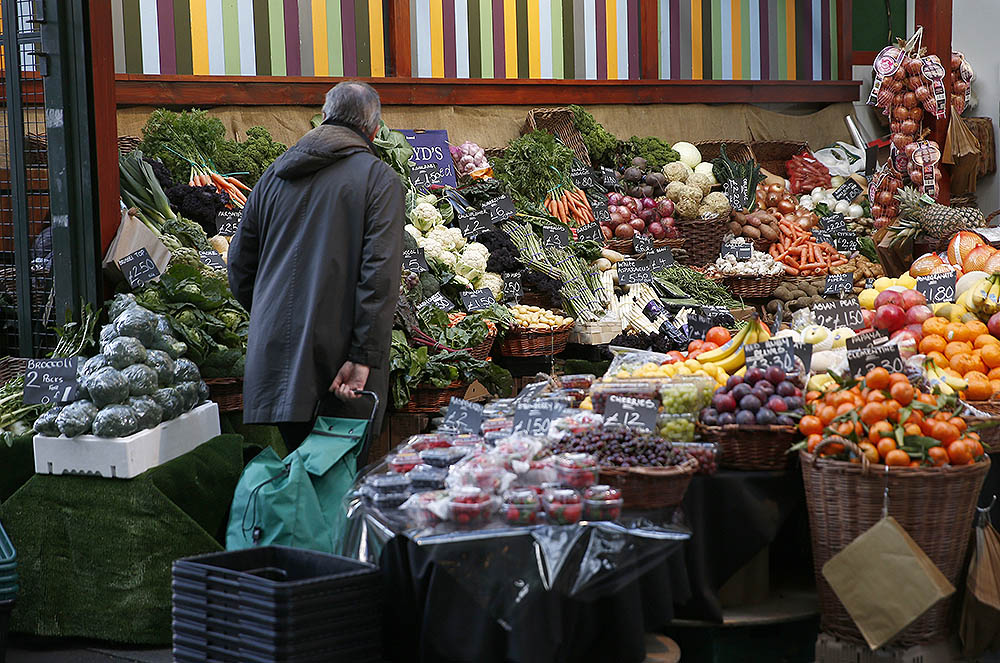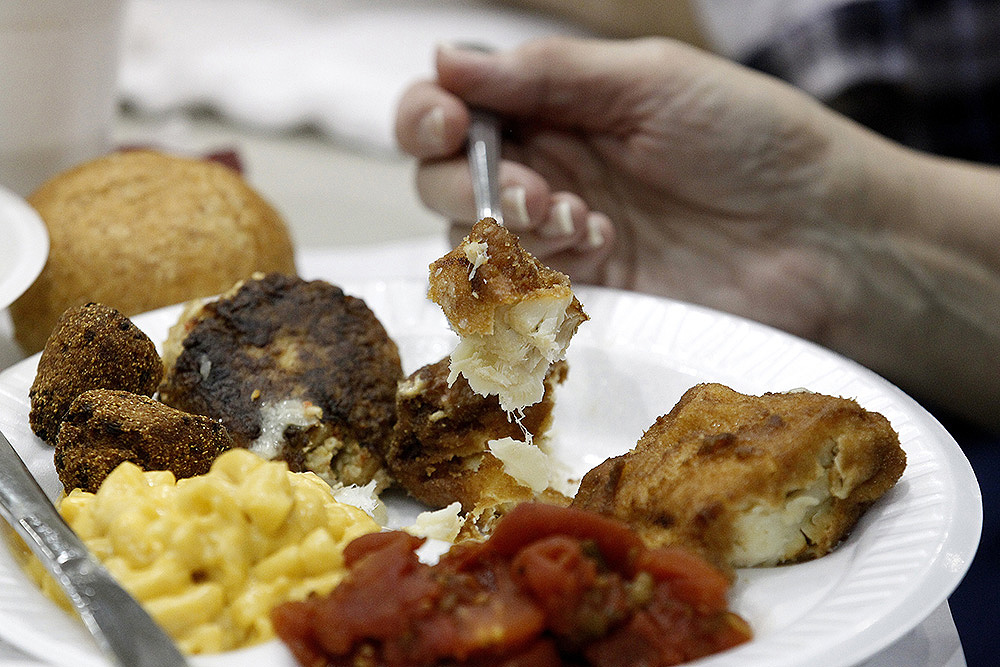
Researchers have wondered about the significance of even the unintended climate impacts of abstaining from meat in one's diet, as with the Catholic tradition of year-round meatless Fridays. (Dreamstime/Arx0nt)
On Nov. 18, 1966, the National Conference of Catholic Bishops — now the United States Conference of Catholic Bishops — released the faithful from the traditional law of Friday abstinence.
The prelates' declaration meant Catholics could eat meat on Fridays, freed from a prohibition that was formerly "binding under pain of sin." Nonetheless, the bishops still encouraged the practice, in the "hope that the Catholic community will ordinarily continue to abstain from meat by free choice as we formerly did in obedience to Church law."
That same year was remarkable for another reason, too. It was the year the August edition of The Mining Congress Journal made a startling admission. "There is evidence that the amount of carbon dioxide in the earth's atmosphere is increasing rapidly as a result of the combustion of fossil fuels," the journal stated. "If the future rate of increase continues as it is at the present, it has been predicted that, because the CO2 envelope reduces radiation, the temperature of the earth's atmosphere will increase and that vast changes in the climates of the earth will result."
While the two events may not seem related, they share a common theme: climate change.
After the Catholic Bishops' Conference of England and Wales reinstated Friday abstinence from meat in September 2011, researchers at Cambridge University wondered what was the potential environmental impact of such a practice. Their 2022 study suggested that giving up meat once a week could cut thousands of tons of carbon emissions annually, even in a country where meat doesn't make up the majority portion of dinner plates.

A shopper browses at a vegetable market in London Feb. 3, 2017. (CNS/Reuters/Peter Nicholls)
If American Catholics returned to meatless Fridays outside of Lent, what would be the resulting climate impact?
Ricardo Simmonds — policy adviser for environmental justice and climate change in the U.S. bishops' Office of Justice, Peace, and Human Development — noted that he has "never seen anywhere the reason for reinstituting the annual abstinence from meat was because of climate change."
The U.K. bishops have said that their motivation for reinstating the practice of meat free Fridays in 2011 was to increase religiosity and provide a public witness. In the U.S., Catholic bishops have encouraged the practice "for the intention of the protection of Life, Marriage, and Religious Liberty."
That said, researchers — including Simmonds, whose doctoral dissertation focused on the topic — have wondered about the significance of even the unintended climate impacts of abstaining from meat in one's diet.
The U.S. Environmental Protection Agency estimates that agriculture, forestry and other land use produces about 24% of global greenhouse gas emissions. "Beef and dairy have a disproportionate and outsized impact on that," said Simmonds.
The Cambridge study — "Food for the Soul and the Planet: Measuring the Impact of the Return of Meatless Fridays for (Some) UK Catholics"— found that only a quarter of the U.K.'s 4 million Catholics observed the bishops' precept. Nonetheless, the study projected it reduced 55,000 tons of carbon annually, or the equivalent of 82,000 fewer people flying round-trip from London to New York during the course of a year.
"And that's for a country which does not have a Catholic majority, or have a high quantity of beef consumption compared to other places," said Simmonds. "It still made an impact."
Simmonds noted that American meat consumption is 61% higher than in the U.K. The populations of Brazil, Argentina and the United States lead the world in meat consumption.
"How much meat is too much is a question a lot of people in developed nations, wealthy nations, need to ask themselves," reflected Simmonds. "Do we need to eat meat every day?"
The Bishops' Conference of England and Wales' question-and-answer document "Catholic Witness — Friday Penance" admits that the history of why Catholics abstain from meat is murky.
"The precise reason for the traditional practice of abstaining specifically from meat on Fridays and other penitential days is not known," it states. "What is without doubt is that it is a very ancient tradition, common to both the Latin Rite Church and the Eastern Rite Churches."
"Thinking about this in the context of environment impact overall, and climate change, is an opportunity for Catholics and other religions to rethink their practices and connect to their roots of these traditions," Simmonds suggested, "and give more meaning in a world that's facing different challenges."
"Globally, 14.5% of all human-related greenhouse gas emissions come from the animal sector," said Becky Ramsing, senior program officer for food communities and public health at Johns Hopkins' Center for a Livable Future.
Advertisement
The United Nations Intergovernmental Panel on Climate Change stated in 2013 that animal agriculture byproducts of methane and nitrous oxide — mainly produced by manure storage — have substantial environmental impacts. For methane, the effect on global warming is 28 times higher than carbon dioxide, while nitrous oxide has a global warming potential 265 times higher than carbon dioxide.
Since 2003, the Center for a Livable Future has provided scientific advice to the international campaign for Meatless Mondays, focusing on evidence-based outcomes, as well as health and environmental factors.
Echoing Simmonds, Ramsing said that based on the surveys they've done over the years, climate change isn't the primary reason most people stop eating meat, rather "health is the reason people will actually consider it."
Ramsing and her research colleague Brent Kim — the center's program officer for food production and public health — estimate the potential environmental impact of the U.S.'s 73.5 million Catholics abstaining from meat on Fridays throughout the year is sizable.

Fried haddock and other items are seen on a guest's plate during a fish fry in the parish hall of St. Mary's Church in Altoona, Pennsylvania. (CNS/Bob Roller)
If all U.S. Catholics stopped eating meat on all Fridays of the year, it would save more than 32 billion kilograms of carbon dioxide, the equivalent of annual CO2 emissions from more than 3.6 million gallons of gasoline consumed, or the equivalent of greenhouse gas emissions from more than 7 million gasoline-powered passenger vehicles driven for one year. It would also save more than 20.5 trillion liters of water annually, the equivalent of more than 8 million Olympic swimming pools.
People who take a single action — like committing to meatless meals one day per week — will often extend their action to other changes, said Ramsing, noting that even if the original motivation may have been health or religious commitment, it could lead to greater environmental impact and awareness.
Henry Glynn — who serves as a Catholic Climate Covenant Common Home Corps adviser — hopes the U.S. bishops' conference will eventually consider reestablishing Friday meat abstinence.
"I would love to see the U.S. bishops and the world's bishops come out in favor of something like this," said the high school social studies teacher at St. Joseph Academy in Brownsville, Texas.
Glynn called it "a step forward" that addresses "what both sides — if there are two sides of the American church — are asking for, which is increased levels of piety and reverence. It's this ancient tradition in the church, and we're going to fast on Friday because Jesus died on Friday, that's theologically sound; I'm into it," he said.
Additionally, Glynn said, the practice would show the church having "a more intentional care for the Earth, and a recognition that we are in solidarity and direct encounter and reliance upon every other living thing, including what we put into our bodies."
Growing up in small-town Kansas and as an undergraduate at Creighton University in Omaha, Nebraska, Glynn was used to a meat-focused menu. But in his first theology course, he was exposed to Pope Francis' encyclical Laudato Si', which he found "really tied it all together" for him.
Between his sophomore and junior years, Glynn spent a summer on a farm in Tanzania, both working the land and teaching at a local school. It was then that a certain imbalance hit home.
"We ate no meat. Nobody eats meat there — except the richest people who can afford it," said Glynn. "And it was then that I really started to take into account, 'Wow, it must take a lot of water and a lot of land to grow a cow — but also, to feed and harvest any other kind of meat-giving animal that we've become accustomed to as the norm in the United States and other developed countries."
Glynn decided in his senior year to fast from meat not only on Fridays in Lent, but for the entirety of Lent. He saw benefits to his prayer life and his health, saying, "It wasn't nearly as hard as I thought it was going to be."
Glynn told EarthBeat, "There's rich social and theological traditions behind this move — and I think if there's ever been a time when it makes sense, it's now."










